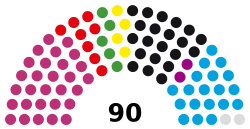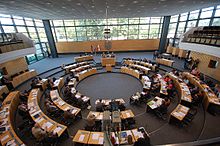Landtag of Thuringia
You can help expand this article with text translated from the corresponding article in German. (September 2013) Click [show] for important translation instructions.
|
This article needs additional citations for verification. (February 2013) |
Landtag of Thuringia Thüringer Landtag | |
|---|---|
 | |
 | |
| Type | |
| Type | |
| Established | 1920 |
| Leadership | |
President | |
| Structure | |
| Seats | 88 |
 | |
Political groups | Government (44)
Opposition (44) |
| Elections | |
Last election | 1 September 2024 |
| Meeting place | |
 | |
| Landtag of Thuringia, Erfurt | |
| Website | |
| www.thueringer-landtag.de | |
The Landtag of Thuringia is the parliament of the German federal state of Thuringia. It convenes in Erfurt and currently consists of 88 members from five parties.[1][2] According to the free state's constitution, the primary functions of the Landtag are to pass laws, elect the Minister-President and control the government of Thuringia.
Elections
[edit]
Elections are held every five years using the German Mixed-member proportional representation (MMP) system, with an election threshold of 5% vote share to receive any seats. All German citizens 18 years of age or older living in Thuringia are entitled to vote. If a party wins more constituency seats than its overall share of the vote, the overall size of the Landtag increases because of these overhang and leveling mandates.
Current composition
[edit]The 2024 Thuringian state election was disastrous for the Left, which lost more than half of its seats, and the three parties that are governing on the federal level: The so-called traffic light coalition consisting of SPD, Greens and FDP, the latter two of which lost all of their seats.
This election was the first time in the history of the Federal Republic that a far-right party (Alternative for Germany) won first place.[3]
| Party | Seats | Group leader | |
|---|---|---|---|
| Alternative for Germany (AfD) | 32 / 88 |
Björn Höcke | |
| Christian Democratic Union (CDU) | 23 / 88 |
Mario Voigt | |
| Sahra Wagenknecht Alliance (BSW) | 15 / 88 |
Katja Wolf | |
| The Left (Linke) | 12 / 88 |
Steffen Dittes | |
| Social Democratic Party (SPD) | 6 / 88 |
Matthias Hey | |
Historical composition
[edit]-
1st Landtag.
-
2nd Landtag.
-
3rd Landtag.
-
4th Landtag.
-
5th Landtag.
-
6th Landtag.
-
7th Landtag.
-
8th Landtag.
History
[edit]
The Landtag of the newly established Free State of Thuringia (Freistaat Thüringen) first convened in 1920 in Weimar. Its deputies were elected for three years according to a proportional representation system, with a minimum voting age of 21. During the Weimar Republic period until 1933, six state elections were held. Upon the 1929 elections, Thuringia became one of the first German federal states where the Nazi Party gained real political power. Wilhelm Frick was appointed Minister of the Interior for the state of Thuringia after the NSDAP won six delegates to the Landtag. In the 1932 elections the Nazis emerged as the strongest party with 26 of 61 seats and Fritz Sauckel assumed the office of Minister-President. Following the Nazi seizure of power in Berlin, the Landtag was abolished in the Gleichschaltung process by the "Law on the Reconstruction of the Reich" of 30 January 1934.[4]
After World War II, the State of Thuringia was re-established as part of the Soviet occupation zone. On 13 June 1946 the Soviet Military Administration summoned a state assembly (Landesversammlung) chaired by Ricarda Huch; the first post-war Landtag elections] were held on 20 October 1946 and the constituent meeting took place on November 21 at the Elephant hotel in Weimar. By the time of the Constitution of East Germany in 1949, the Landtage were largely deprived of power and the second state elections on 15 October 1950 were already held under the terms of the National Front unity list. In 1952, the East German government dissolved the federal states and Thuringia was divided into districts (Bezirke) centered in Erfurt, Gera and Suhl.
The State of Thuringia was restored during Germany's reunification and Landtag elections were again held on 14 October 1990.
After the 2019 general election there was a government crisis. It was triggered by the election of Thomas Kemmerich (FDP) as Prime Minister of Thuringia with the votes of the AfD (despite the secret ballot), on February 5, 2020. The process received a lot of attention both nationally and internationally because for the first time In the history of the Federal Republic of Germany, a prime minister came into office thanks to decisive votes from the right-wing extremist AfD.[5][6][7]
The Thuringian state government then consisted only of the Prime Minister for four weeks. Kemmerich resigned on February 8, 2020 and was in office until Bodo Ramelow (The Left) was elected Prime Minister on March 4, 2020.[8] After Kemmerich's election, no members were named for the German Bundesrat (Federal Council),[9] and he himself also decided not to represent Thuringia there. Kemmerich was accused of lacking involvement in government affairs.
After the controversial election of Kemmerich, there was an announcement of the resignation of the CDU federal chairwoman Annegret Kramp-Karrenbauer,[10][11] the withdrawal of the Thuringian CDU state and parliamentary group leader Mike Mohring,[12] the dismissal of the federal government's Eastern Commissioner Christian Hirte by chancelor Angela Merkel[13] and the failure of the FDP to meet the five percent hurdle the Hamburg state election 2020.[14]
See also
[edit]- Politics of Thuringia
- Constituencies of the Landtag of Thuringia
- List of presidents of the Landtag of Thuringia
- 1990 Thuringian state election
- 1994 Thuringian state election
- 1999 Thuringian state election
- 2004 Thuringia state election
- 2009 Thuringia state election
- 2014 Thuringian state election
- 2019 Thuringian state election
- 2024 Thuringian state election
Notes
[edit]- ^ Working as a constructive opposition, without a formal confidence and supply agreement with the government.
References
[edit]- ^ Thüringer Landtag (ed.). "Seat allocation of the Thuringian State Parliament". Retrieved 12 November 2023.
- ^ Mitteldeutscher Rundfunk, ed. (22 December 2022). "Landtag löst Gruppe "Bürger für Thüringen" einstimmig auf". Retrieved 12 November 2023.
- ^ "What is the AfD? The reasons behind rise of hard right in Germany". www.thetimes.com. Retrieved 2024-12-30.
- ^ "Law on the Reconstruction of the Reich". Retrieved 26 February 2023.
- ^ Schultheis, Emily (2020-02-21). "Germany's far right shows its true strength: feeding political chaos". CNN. Retrieved 2024-11-14.
- ^ "Germany AfD: Thuringia PM quits amid fury over far right". 2020-02-06. Retrieved 2024-11-14.
- ^ "La démission du dirigeant de la région allemande de Thuringe ne met pas fin à la tempête" (in French). 2020-02-07. Retrieved 2024-11-14.
- ^ tagesschau.de. "Thüringen: Kemmerich tritt als Ministerpräsident zurück". tagesschau.de (in German). Retrieved 2024-11-14.
- ^ Orde, Sabine am; Lehmann, Anna; Pauli, Ralf; Sturm, Georg; Schindler, Franziska (2020-02-19). "Regierungskrise in Thüringen: Ein Bundesland steht still". Die Tageszeitung: taz (in German). ISSN 0931-9085. Retrieved 2024-11-14.
- ^ deutschlandfunk.de (2020-02-07). "CDU nach Wahl-Eklat von Thüringen - "Ein Desaster für Kramp-Karrenbauer"". Deutschlandfunk (in German). Retrieved 2024-11-14.
- ^ "Nach Thüringen-Debakel: Kramp-Karrenbauer kündigt Rücktritt als CDU-Chefin an". Der Spiegel (in German). 2020-02-10. ISSN 2195-1349. Retrieved 2024-11-14.
- ^ Decker, Markus (2023-10-31). "Abenteuerspielplatz Politik: Warum sich die Karriere von Mike Mohring dem Ende nähert". www.rnd.de (in German). Retrieved 2024-11-14.
- ^ "Thüringer Altministerpräsidenten wollen Hirte als neuen CDU-Landeschef". Der Spiegel (in German). 2020-06-08. ISSN 2195-1349. Retrieved 2024-11-14.
- ^ "Wahl in Hamburg: Thüringen, die FDP und das Problem der Demokratie - WELT". DIE WELT (in German). Retrieved 2024-11-14.








